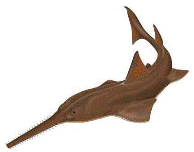Papers in the Biological Sciences

Investigations of the Ichthyofauna of Nicaraguan Lakes
Date of this Version
1976
Abstract
Five species of monogeneans and 14 species of cestodes are reported from two elasmobranch species in fresh waters of Guatemala, Nicaragua and Costa Rica. Monogeneans from the bull shark, Carcharhinus leucas (Muller and Henle, 1841), are: Dermophthirius maccallumi n. sp. (Microbothriidae); Heteronchocotyle leucas Hargis, 1955 and Erpocotyle carcharhini n. sp. (Hexabothriidae). Cestodes from the bull shark are: Phyllobothrium lactuca van Beneden, 1850, P. leuci n. sp., P. nicaraguensis n. sp., Anthobothrium cornucopia van Beneden, 1850, A. laciniatum Linton, 1890 (Phyllobothriidae): Platybothrium hypoprioni Potter, 1937, Phoreiobothrium triloculatum Linton, 1901 (Onchobothriidae); Cathetocephalus thatcheri Dailey and Overstreet, 1973 (Cathetocephalidae); Dasyrhynchus variouncinnatus (Linton, 1924) and Callitetrarhynchus gracilis (Rudol phi, 1819) (Dasyrhynchidae); Nybelinia bisulcata (Linton, 1889) (Tentaculariidae); and Otobothrium penetrans Linton, 1907 (Otobothriidae). From the sawfish, Pristis perotteti Muller and Henle, 1841, are two monogeneans, Erpocotyle caribbensis n. sp. and Pristonchocotyle intermedia n. g., n. sp.(Hexabothriidae); and two cestodes, Phyllobothrium prutis n. sp. and Anthobothrium pristis Woodland, 1934 (Phyllobothriidae). The helminths found in these two species of euryhaline elasmobranchs are of marine origin or have strong marine affinities.


Comments
Published in INVESTIGATIONS OF THE ICHTHYOFAUNA OF NICARAGUAN LAKES, ed. Thomas B. Thorson (University of Nebraska-Lincoln, 1976). Copyright © 1976 School of Life Sciences, University of Nebraska-Lincoln.